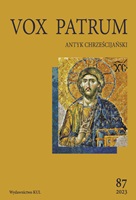Siedem sztuk wyzwolonych w EtymologiachIzydora z Sewilli
The Seven Liberal Arts in the Isidore of Sevilles’ Etymologies
Author(s): Tatiana Krynicka, Adam WilczyńskiSubject(s): Cultural history, Aesthetics, Social history, Ancient World, Sociology of Culture, Sociology of Art, History of Art
Published by: Katolicki Uniwersytet Lubelski Jana Pawła II - Wydział Teologii
Keywords: Seven liberal arts; leisure in the Ancient world; Isidore of Seville, Etymologies;
Summary/Abstract: Canon of the seven liberal arts belongs to the most prominent achievements of the ancient culture. Ancient thinkers considered them to be sciences worthy of a free person, who dedicates to their studying leisure time, without physical efforts and not for profit-mak-ing goals. For Christian writers these are sciences that lead to the discovering of truth which makes a person free. Cassiodorus underlines the fact of their transmission via books (liber) and emphasises their fundamental significance for the human beings’ progress. Isidore of Seville leads his reader to the fascinate world of knowledge through the gates of seven lib-eral arts as he devotes to them the first three books of his Etymologies. In his discourse on them the grammar occupies the central place (book 1); philological sciences (books 1-2) are presented more profoundly than mathematic disciplines (book 3). Organization of material drawn from his sources is well thought-out, systematic, to some extent original (book 1), in some parts of text (especially those dealing with grammar) somewhat chaotic and incoher-ent, though. Isidore sums up the role of liberal arts in the ending part of the book 4, while emphasizing that they form the indispensable foundation of doctor’s education.
Journal: Vox Patrum
- Issue Year: 2023
- Issue No: 87
- Page Range: 191-216
- Page Count: 26
- Language: Polish

